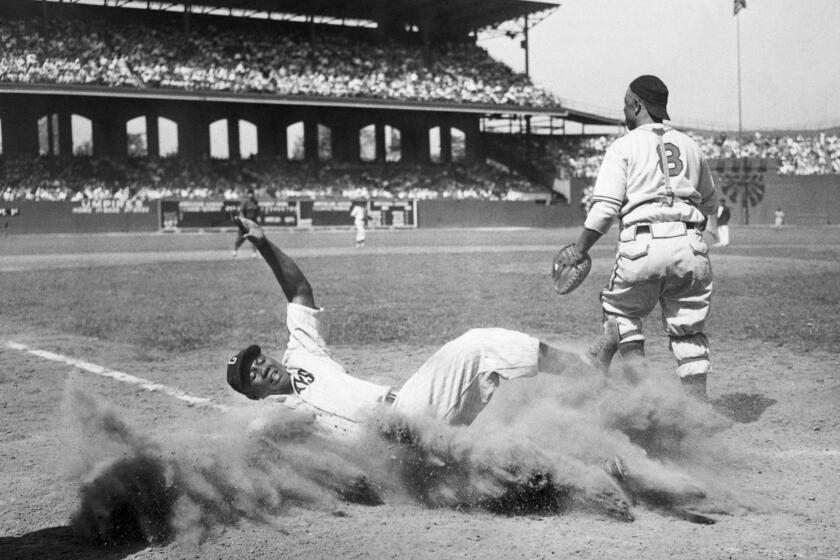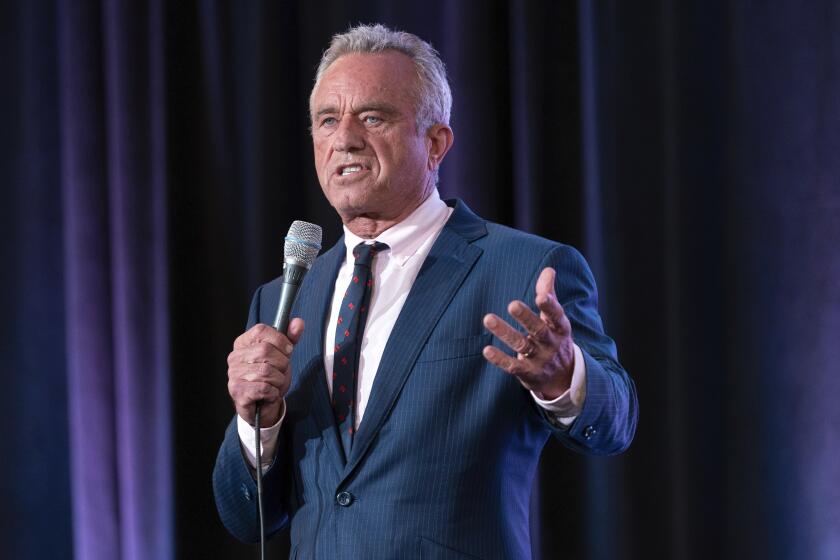April 25 Protest Divides Union Leadership
Since the Vietnam War, leaders of America’s unions have generally engaged in quiet, even cordial debates with one another over international issues despite some sharp differences--until now.
That cordiality evaporated recently after top officers of most of the nation’s largest unions and many direct representatives of the national AFL-CIO agreed to join rallies and marches on April 25 in San Francisco and Washington to protest President Reagan’s foreign policy, particularly his support of efforts by the contras to overthrow the government of Nicaragua.
The continuing growth in the number of unions supporting the rallies provoked AFL-CIO President Lane Kirkland into writing a letter that harshly attacked many of the goals of the demonstrations and questioned the commitment to unionism of some of the scheduled speakers.
He said the rallies “will call for a cutoff of U.S. aid to the democratically elected governments of El Salvador, Honduras and Guatemala.”
Although protest organizers dispute him, Kirkland also contended that “among the invited speakers are representatives of organizations supporting the guerrilla forces seeking to overthrow the democratically elected Duarte government in El Salvador, as well as representatives of the Sandinista government of Nicaragua, which has not been democratically elected.”
Kirkland said the policies of the Reagan Administration and those of rally organizers are “equally irresponsible.”
Naturally, there are diverse views among the demonstration sponsors since they represent a wide variety of religious and political organizations, civil rights groups and peace activists across the nation, in addition to the unions.
However, they say they are united in the belief that, under Reagan, the United States is encouraging an ever wider, bloodier war in Central America.
The protests will also be aimed against the Adminstration’s positions on South Africa and in favor of a major new push to end the nuclear arms race.
The AFL-CIO president’s attack on the April 25 demonstrations was surprisingly harsh, since many of the rally organizers do head the largest AFL-CIO unions.
Unfortunately, Kirkland has not only put at least a slight damper on the strong union protests against Reagan’ policies, but he has also diminished his own role as a unifier of unions.
Despite his own generally conservative stand on foreign policy issues, Kirkland has won praise from the liberal wing of the AFL-CIO for seeking and getting a consensus on controversial issues before issuing statements on behalf of the entire 13.5-million-member labor federation.
When there was no clear majority on a controversial question, the AFL-CIO took no stand on it, and Kirkland would not try to pressure his colleagues into agreement.
Under Kirkland, and with open, angry debates over the Vietnam War no longer dividing them, U.S. unions became more unified than they had been for decades. But Kirkland did not have a consensus among union leaders for his denunciation of the April 25 demonstrations.
The union leaders protesting Reagan’s foreign policies represent the majority of the nation’s union members. If they continue to hold firm, they can help build public opposition to Reagan’s costly Central American policies.
But it isn’t enough to join or sponsor a one-day demonstration. They should put on a major follow-up campaign, giving their members clear explanations by mail and at union meetings of their reasons for taking to the streets.
The planned participation in the demonstrations by so many influential officers of major AFL-CIO affiliates might have gone unchallenged by Kirkland if they had not been joined by other union leaders who directly represent the federation itself at the state and local level.
Here’s why: Since the AFL-CIO affiliates are divided on such questions as aid to the contras, the federation, in effect, adopted a “hands-off” position on it, as it has on some other divisive issues.
That meant that officers of the 92 unions affiliated with the labor federation were, and still are, free to pursue their own policies, which resulted in the outpouring of union opposition to most of Reagan’s foreign policies.
But officers of state and local labor federations are agents of the national AFL-CIO and so are obliged to conform to its “hands-off” position.
Uncharacteristically, however, Kirkland went beyond warning the state and local AFL-CIO representatives to stay clear of the demonstration when he attacked the planned events and their sponsors.
The protest organizers say that despite Kirkland’s action, their ranks are holding firm. But he may have discouraged leaders of other unions from joining the demonstrations, and he probably stopped most if not all participation by state and local AFL-CIO representatives who are listed as sponsors of the protests.
The protests will go ahead. It’s understandable that Kirkland would expect AFL-CIO representatives to follow the national’s policy, but it seems to be a serious mistake to attack the demonstrations themselves and their broad support from the AFL-CIO’s own affiliates.
Senate to Scrutinize Pension-Raid Schemes
Some much-needed legislation to protect workers’ pensions should certainly get a boost from the apparently unprecedented use--or misuse--of a North Carolina pension fund by a consortium of nine banks and Drexel Burnham Lambert Inc.
Drexel, which is currently a target of a government investigation of illegal stock trading, was the financial adviser in a “junk bond” offering and loan agreement that was arranged to help Schick Inc. buy Reeves Bros., a relatively small North Carolina textile and upholstery company.
The Reeves deal was made possible by the fact that, for the past several years, rising stock prices have put billions of dollars more in pension funds than are needed to pay off their current beneficiaries.
It may be wrong, but it is neither uncommon nor illegal--yet--for companies to terminate their workers’ pension funds and keep for themselves the money left after buying insurance annuities for the beneficiaries. This is what was done at Reeves.
In fact, it is estimated that since 1980, 1,000 firms have taken $12 billion from terminated pension plans, primarily from companies in bankruptcy proceedings.
When companies go bankrupt, the federal government bails out the failed plans. The Federal Pension Benefit Guaranty Corp. is facing a $4-billion deficit because of its takeover of several pension plans from bankrupt steel firms.
But neither Schick nor Reeves is bankrupt, and taking money from the pension fund to finance a takeover deal ignores the needs of the workers for whom the pension funds were created in the first place. And it was done despite protests by the workers.
Drexel and the banks went a step further than the usual, though dubious, system of managers draining money out of pension funds. Before the banks would make the loan for the buyout, Reeves had to promise to kill its pension program and use the “excess” money to reduce the size of the loan instead of boosting the meager pensions of its workers.
The Amalgamated Clothing and Textile Workers, which represents about 750 of Reeves’ 5,000 workers, denounced the action as unconscionable, saying the pension fund was created for the workers and any money in the fund should be given to them, not Drexel, the banks or the corporate executives.
As part of its campaign against the deal, the union is distributing leaflets at Drexel offices around the country, using a parody of Drexel’s slogan: “Helping People Manage Change.” The union version of Drexel’s slogan is: “Helping People Hurt People.”
Reeves’ hourly workers only get pensions of up to $61 a month. Those benefits could be raised if all the pension fund money was used for them.
Instead, about $20 million of the fund’s money is siphoned off for the corporate takeover.
The Reeves buyout scheme will be examined today in Washington by a Senate committee that is considering legislation to forbid corporate raiders and company managers from terminating workers’ pension plans and using the profits for themselves.
It may already be too late for Congress to heed the union’s plea to help the Reeves workers.
But their plight should speed congressional action to stop the pension skimming deals.
More to Read
Start your day right
Sign up for Essential California for news, features and recommendations from the L.A. Times and beyond in your inbox six days a week.
You may occasionally receive promotional content from the Los Angeles Times.






